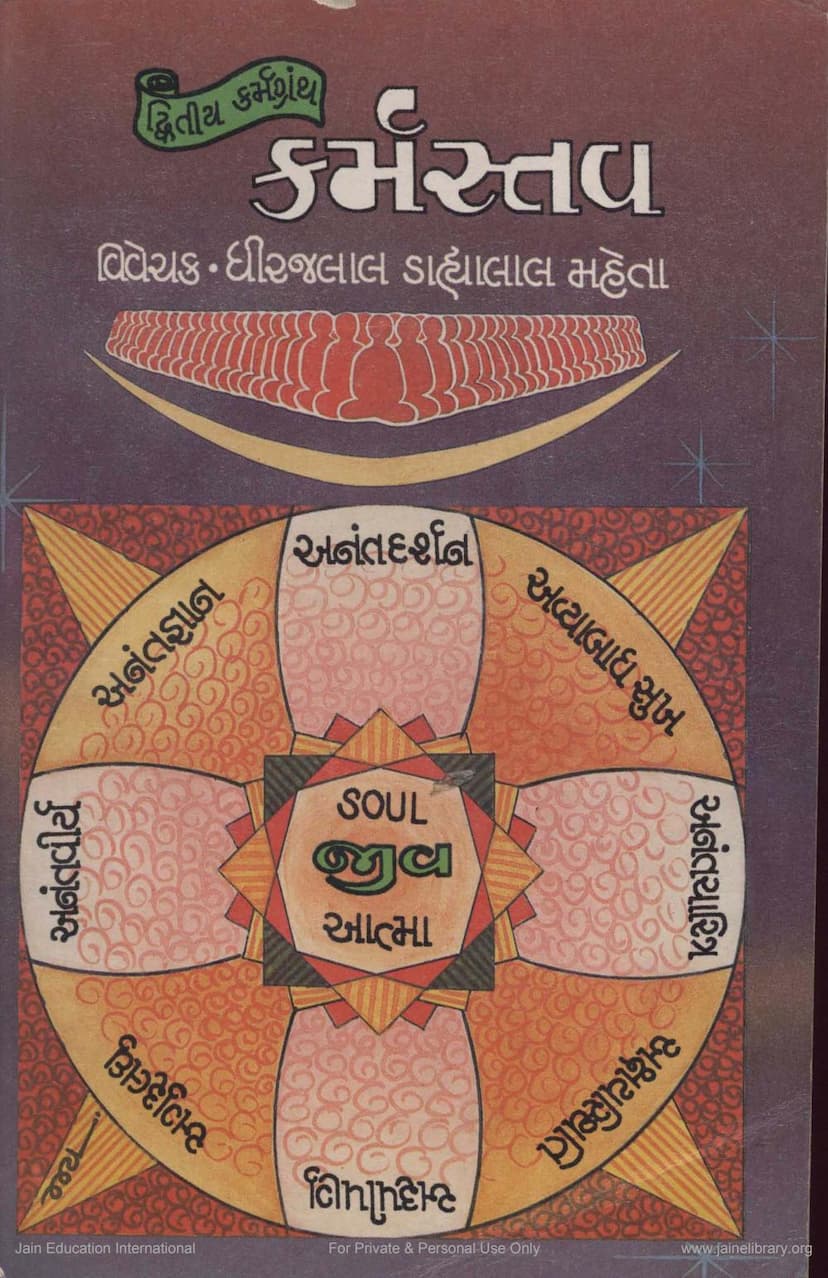Karmagrantha Part 2 Karmastav Tika
Added to library: September 2, 2025

Summary
This document is the second part of the "Karmagrantha" series, titled "Karmastav Tika," authored by Devendrasuri, Abhayshekharsuri, and Dhirajlal D. Mehta. Published by Jain Dharm Prasaran Trust, Surat, the book is a detailed commentary in Gujarati on the "Karmastav" text, originally composed by Acharya Devendrasurishwarji.
The book is a comprehensive guide to the Jain concept of karma, explaining the intricate workings of karmic bonds, their manifestation (udaya), their premature release (udiraṇa), and their latent presence (sattā). It delves deeply into the fourteen stages of spiritual development (Guṇasthānas) in Jainism, detailing how different types and quantities of karmas are bound, experienced, and potentially shed at each stage.
Key Features and Content:
- Structure: The commentary follows the original text, presenting the Sanskrit verses, their Gujarati translation, word-by-word meanings, stanza-wise explanations, a glossary of technical terms, and a Q&A section.
- Core Concepts Explained:
- Bandha (Bonding): The process by which karmic matter (kārmarṇavargaṇā) attaches to the soul due to passions (mithyātva, avirati, kaṣāya, yoga). It covers four aspects: pratirodha (covering), sthiti bandha (duration), rasa bandha (intensity), and pradeśa bandha (quantity).
- Udaya (Manifestation): The experiencing of the results of bound karma at the appropriate time or through premature release.
- Udiraṇa (Premature Release): The act of releasing karmas before their scheduled time through specific efforts or modifications.
- Sattā (Latent State): The state of karma that is bound but not yet manifested or released, remaining in a latent state with the soul.
- The Fourteen Guṇasthānas: The book meticulously explains each of the fourteen stages of spiritual progress, from the initial stage of utter delusion (mithyādṛṣṭi) to the final stage of pure, liberated soul (ayogikēvalī). For each stage, it details:
- The specific types of karma that are bound, manifested, released, or in a latent state.
- The cessation (ucdhēda) or non-occurrence (anudaya) of specific karmas at various stages.
- The progress of the soul through these stages, including the role of specific karmic activities like "karaṇas" (yathāpravṛtta, apūrva, and anivṛtta).
- Detailed Karmic Analysis: The text provides a granular analysis of the 148 (or 158) types of karmic permutations (uttara prakṛti) and their presence in the fourteen Guṇasthānas, often presented in detailed tables.
- Author's Intent: The author, Dhirajlal D. Mehta, aims to make the complex subject of karma accessible through simple Gujarati. The work is dedicated to promoting Jainism and includes the author's other published works.
- Spiritual Progression: The book emphasizes that the gradual shedding of karmic obstructions and the development of inherent virtues of the soul (knowledge, perception, conduct, energy) are the keys to spiritual progress, as reflected in the progression through the Guṇasthānas.
- Commentary on the Text: The commentary explains the original verses of "Karmastav," clarifying the intricate philosophical points and the progression of the soul through different karmic states. It also discusses the various meanings of the term "Vīra" as applied to Lord Mahavir.
- Emphasis on Memorization: The authors stress the importance of memorizing the contents of this second part of the Karmagrantha series, as it serves as a foundation for understanding subsequent parts, particularly those dealing with nuances of bondage and manifestation.
In essence, "Karmastav Tika" is a scholarly yet accessible work that serves as a vital resource for understanding the fundamental principles of karma in Jainism, presented through the framework of spiritual development and the meticulous analysis of karmic processes across the fourteen Guṇasthānas.